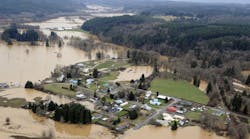Detroit Team Wins Intelligent Water Systems Challenge
A team from the Great Lakes Water Authority and the University of Michigan won the first-ever Intelligent Water Systems Challenge for using data analytics to develop a tool to maximize the use of existing collection systems and minimize combined sewer overflows in Detroit.
The winning project, titled Open-Storm Detroit Dynamics, was announced at the Water Environment Federation Technical Exhibition & Conference 2018 (WEFTEC) in New Orleans and earned the team a $25,000 prize from Xylem Inc.
The Intelligent Water Systems Challenge is hosted by the Leaders Innovation Forum for Technology (LIFT), a joint effort of WEF and the Water Resource Foundation. The competition challenged students, professionals and technology experts to use innovation and data to help solve some of the most difficult issues facing water and wastewater utilities. The challenge began in April and required the 19 participating teams to address real-world problems.
“As we continue to support and promote innovation in the water sector, we are also looking for ways to integrate practical applications,” said WEF Executive Director Eileen O’Neill. “Our hope is that the Intelligent Water Challenge will demonstrate the value of intelligent water systems to utilities and help foster the adoption of smart water technologies.”
The Great Lakes Water Authority team predicted that their solution can enable Detroit’s system to handle an additional 100 million gal with no new construction. Based on Detroit’s costs for building new storage, this translates to savings of about $500 million. The research grant underlying this tool was less than $200,000.
The second prize of $15,000 went to the team from the Metropolitan Water Resources District of Greater Chicago (MWRDGC) for the project, Developing Intelligent Advanced Warning Systems for Odors at Thornton-Composite-Reservoir. The team included members from MWRDGC, Ensaras Inc., and the University of Illinois at Chicago.
The third prize of $5,000 went to the team from Clean Water Services (CWS) in Hillsboro, Ore., for the project, Influential Pump Station Optimization. All six team members came from CWS and reached across both wastewater treatment within the facility as well as field operations.


